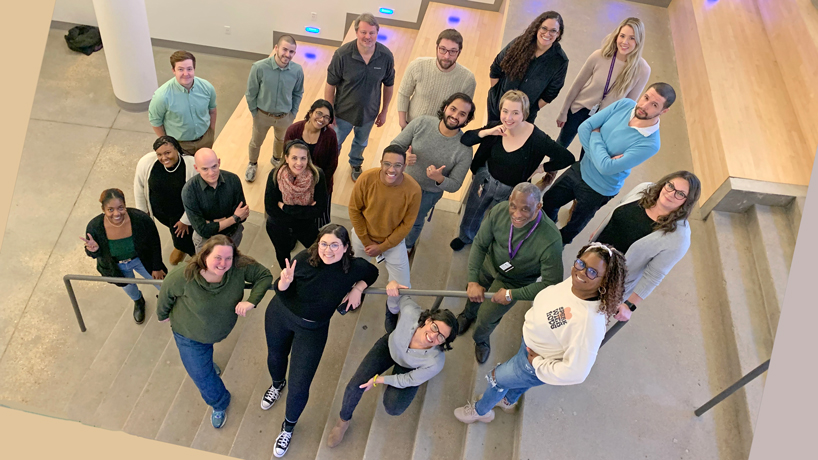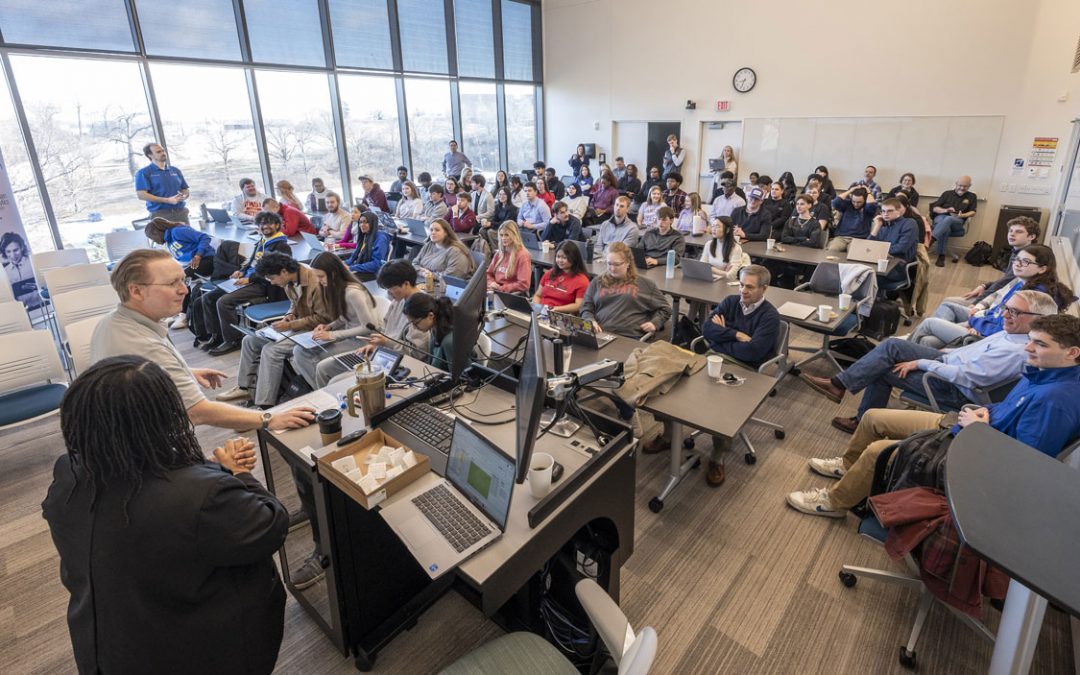
UMSL’s Addiction Science Team, led by Associate Professor Rachel Winograd (front row, third from left), has been expanding over the past few months with the help of new funding directed to the university from state opioid settlements. The team provides administration, implementation and evaluation activities for initiatives led by the Missouri Department of Mental Health to combat the opioid crisis. (Photo by August Jennewein)
The University of Missouri–St. Louis has been central to efforts to combat the opioid crisis in Missouri over the past five years with Associate Professor Rachel Winograd serving as the director of the Missouri Opioid State Targeted Response and Missouri State Opioid Response projects.
Winograd, who holds a dual appointment at the Missouri Institute of Mental Health and in UMSL’s Department of Psychological Sciences, has been leading a group of researchers, social workers and other public health practitioners who provide administration, implementation, and evaluation activities for initiatives led by the Missouri Department of Mental Health. Much of their work is focused on harm reduction to prevent overdose.
The Addiction Science Team has been growing over the past several months while expanding its efforts thanks to more than $6 million in new funding directed to UMSL earlier this fall. The money came from a series of settlements that ultimately will bring nearly half a billion dollars to Missouri over the next 18 years for opioid treatment and other support systems.
“We have a great group of 10 new people from all different backgrounds,” Winograd said. “We have some people who have direct lived experience with substance use disorder and have been involved in the clinical treatment or recovery side of things. They’re coming to be more involved in the planning, programming, infrastructure and system change. We have people who came from other domains of social services – like working with the unhoused. We have someone who just left the military as a medic. We have someone who is an EMT.”
Some of their work involves packing up physical supplies, including naloxone kits used to reverse opioid overdoses, fentanyl test strips that can help reveal the presence of fentanyl in other drugs, and wound care kits.
Winograd said the team has been producing about 12,000 naloxone kits – each containing two doses of the medication – every month. They rely heavily on partners to distribute those kits and other physical supplies where they’re needed most.
Their number of partnerships continues to grow with organizations working on the ground across the state, including The T, Better Family Life Inc. and MO Network in St. Louis; Confluence Harm Reduction in Kansas City; and AIDS Project of the Ozarks in southern Missouri, just to name a few.
“Something that I think we’ve done well and that I’m proud of is we have been able to use our role essentially as an intermediary between the state and small, very local neighborhood organizations to get them funds that they would not get otherwise,” Winograd said. “We act as a pass-through on the state’s behalf, and we have been able to advocate for these organizations that might not have been on the state’s radar. They are doing this work out in their local communities. They deserve a contract. That’s gone well.”
It takes a lot of relationship-building on the part of the team members to create those partnerships.
The team is reaching out more to rural communities with the support of a recent grant from MO-CORPS – Coordinating Overdose Response Partnerships and Support. Outreach Coordinator Greg Boal, the former U.S. Army medical specialist hired in October, has been redesigning training for emergency responders in rural communities.
“The team has been building on a lot of the work we’ve already done and what’s worked and what hasn’t worked in some of this training delivery,” Winograd said.
Winograd has also been working to expand research connected to her team’s implementation efforts. That led to the hiring of Zachary Budesa in May to serve as an assistant research professor and MIMH’s lead evaluator for Missouri’s State Opioid Response Grant.
Since receiving her faculty appointment with the Department of Psychological Studies, Winograd has also opened the Addiction Science, Practice, Implementation, Research, and Education Lab, known as ASPIRE, and has started accepting graduate students. The lab’s research is focused on identifying and reducing barriers to evidence-based treatments for substance use disorders, particularly medical treatments such as buprenorphine and methadone for opioid use disorder; expanding access to naloxone, fentanyl test strips, and other harm reduction tools to help people prevent, recognize and respond to overdose events; evaluating and demonstrating community needs and disparities in access to substance use prevention, treatment and recovery support services; and understanding differences in views toward drug use and related programming.
The challenge to stem the opioid crisis remains significant, but Winograd and her team have seen modest gains. When they began their work in 2017, Missouri ranked 17th nationally among states with the highest overdose death rate. It now has dropped to 25th.
Missouri also saw a smaller than average increase in opioid deaths in 2021, one of the first times the state beat the national average.
“I think a huge reason for that is our team did not pause on our naloxone distribution during COVID whatsoever,” Winograd said. “A lot of states did, and we got these supplies out by any means necessary and have some of the most robust naloxone distribution efforts in the country.”
Winograd is glad to be able to celebrate those wins because she understands the complexity of the crisis and all the factors beyond her team’s control, from the tainted drug supply to the challenges the pandemic created for people trying to obtain services to all the societal factors that influence people’s use of drugs in the first place – including lack of housing, poverty, unemployment and poor education.
“There’s so many things outside of our control that contribute to these increases in overdose deaths, but then you just have to stay the course and be reminded of what is within our scope, that we have an ethical responsibility to push for what we know can save and improve people’s lives,” she said. “With that, I think we’ve done a pretty good job.”
She is just as grateful for the continued support of the Department of Mental Health and its trust in the harm reduction approach she and her team have been guiding.
“I feel really hopeful and optimistic and in some ways awestruck of this team and every person on it,” Winograd said. “Together, we have been able to build something much bigger than ourselves. To see some of the seeds that we’ve planted along the way now really blossom and grow into these projects that we never would have anticipated and these connections that we didn’t used to have. There is interest and receptivity that didn’t used to be there.”
Media Coverage
St. Louis Post-Dispatch
KSDK (Channel 5)
St. Louis Business Journal














